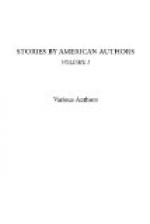Ark out of Pilot-boat, dam by Mudscow
out of Raging Canawl. The Mercy G. Tarbox
is one of the best boats of Nantucket, and Captain
Clearstarch is one of the best captains all along
shore—although, friend Squibob, I feel
sure that you are about to observe that a captain
with a name like that would give any one the blues.
But don’t do it, Squib! Spare me this
once.
But as a matter of fact this ultramarine joke of yours is about east. It was blue on the Mercy G.—mighty blue, too. And it needed the inspiring hope of the gold I was soon to pick up in nuggets to stiffen my back-bone to a respectable degree of rigidity. I was about ready to wilt. But I discovered two Englishmen on board, and now I get along all right. We have formed a little temperance society—just we three, you know—to see if we cannot, by a course of sampling and severe study, discover which of the captain’s liquors is most dangerous, so that we can take the pledge not to touch it. One of them is a chemist or a metallurgist, or something scientific. The other is a gentleman.
The chemist or metallurgist or something scientific is Professor Titus Peebles, who is going out to prospect for gold. He feels sure that his professional training will give him the inside track in the gulches and gold mines. He is a smart chap. He invented the celebrated “William Riley Baking Powder”—bound to rise up every time.
And here I must tell you a little circumstance. As I was coming down to the dock in New York, to go aboard the Mercy G., a small boy was walloping a boy still smaller; so I made peace, and walloped them both. And then they both began heaving rocks at me—one of which I caught dexterously in the dexter hand. Yesterday, as I was pacing the deck with the professor, I put my hand in my pocket and found this stone. So I asked the professor what it was.
He looked at it and said it was gneiss.
“Is it?” said I.
“Well, if a small but energetic
youth had taken you on the back
of the head
with it, you would not think it
so nice!”
And then, O Squib, he set out to explain that he meant “gneiss,” not “nice!” The ignorance of these English about a joke is really wonderful. It is easy to see that they have never been brought up on them. But perhaps there was some excuse for the professor that day, for he was the president pro tem. of our projected temperance society, and as such he head been making a quantitative and qualitative analysis of another kind of quartz.
So much for the chemist or metallurgist or something scientific. The gentleman and I get on better. His name is Beaver, which he persists in spelling Beauvoir. Ridiculous, isn’t it? How easy it is to see that the English have never had the advantage of a good common-school education—so few of them




